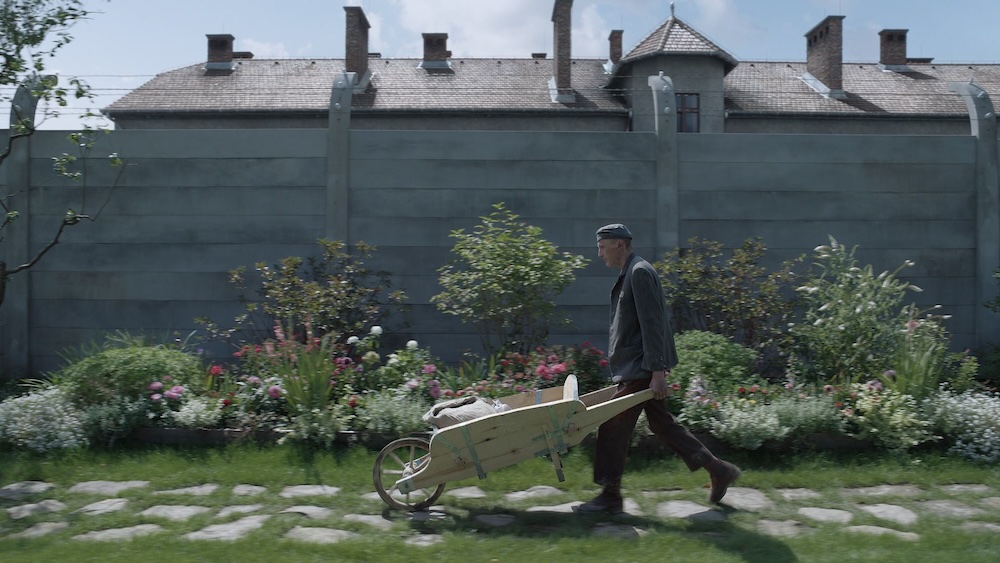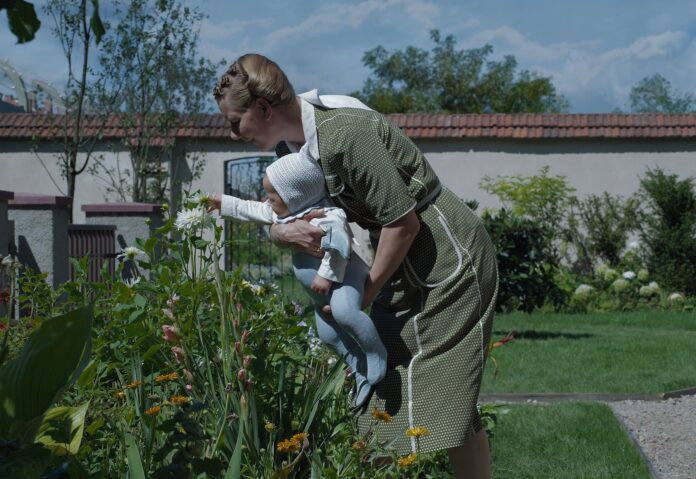The late Martin Amis published The Zone of Interest 10 years ago, to a positive if somewhat reserved reception. Its subject seemed a surprising, provocative choice for an author generally inclined towards snark, and some found the satirical and sexual elements in poor taste for a novel about the Holocaust. Albeit not directly about the Holocaust, for the most part, which was precisely the fascination of its premise. In imagining the domestic life of Auschwitz’s commandant, occupying a little paradise of bourgeoise prosperity just outside the gates of an earthly hell, Amis sought to vividly personify that slippery concept, “the banality of evil.”
Jonathan Glazer is a director whose style is often a kind of maxi-minimalism, and his new film version of Zone is indeed stripped-down. Any satire is very subtle, any sexuality even more so. (It is only hinted that our male protagonist exploits female camp inmates for such “favors,” not unlike his wife does for free household labor.) I loved the music video veteran’s first feature in 2000, Sexy Beast. The ensuing Birth and Under the Skin were more problematic, arguably cryptic to a point of mannerism. Still, they attested to a singular sensibility. And Zone applies their aesthetic and narrative rigor to a theme they are ideally suited for.
Though it’s hardly likely to be seen by the people who could most benefit (and admittedly, they might not understand it anyway), this is very much the right movie at the right time—a portrait of venomous evil masquerading as self-righteous ideology, arriving as the threat of resurgent fascism becomes undeniable even here in the U.S. of A.
First seen enjoying a lakeside picnic afternoon in what might be a recruitment poster for the wholesome, close-to-nature Master Race lifestyle, the Hoss clan indeed exemplifies family values and the American Dream… if those ideas were transplanted to the Third Reich. They are thoroughly heterosexual, industrious, fun-loving but disciplined, paving the road to a sunny future with a large brood of healthy children. They’ve worked their way from humble origins to something near the top, while remaining in loyal service to superiors. Their happiness is the universal kind of contentedly achieved material comfort, plus stable prospects going forward. Complete with a pool in the backyard, this picture isn’t all that different from the prosperity of post-WW2 American suburbia.
Except that patriarch Rudolph Hoss (Christian Friedel) is the SS officer in charge of a huge death camp whose machine gun-patrolled, barbed-wire-topped high fence borders the family’s immaculate front yard. While local residents cannot see inside those confines (unless employed there, of course), frequent screams and gunfire comprise a constant muffled background noise to the illusion of an ordinary everyday life that those good Nazis housed nearby maintain.
Mass murder, among other things, is the elephant in the room here, omnipresent if never spoken of. Still, after a while we realize that in one way or another, nearly all the Hoss’ children seem disturbed—on some level, they know they are living in (or at least adjacent to) a nightmare. When a mother-in-law visits, her initial pride and wonder at the couple’s great food fortune soon withers to unspoken horror; she cannot acclimate to the level of denial required here.
No such qualms plague Frau Hoss, Hedwig (Sandra Huller). Blonde hair wound into grotesquely tight coils on her noggin, she presents a drab, peasant-y hausfrau front, behind which lurks a hungry dragon. After taking the choicest items (notably a luxe fur coat) for herself, she cheerfully distributes clothing and jewelry to neighbors and staff. That’s just the latest haul from mostly Jewish camp arrivals who may well be dead by the time these items’ new owners try them on. Meanwhile, Rudolf similarly lays surreptitious claim to any requisitioned valuables, especially hard cash. With all this stuff up for grabs, every day is like winning a lottery. Never mind that these freebies were wrested from human beings soon stripped of every other remaining dignity, then exterminated.
As with so many ordinary monsters, the Hosses are driven by resentment. They justify their ill-gotten gains as the spoils of having climbed up from lower-class beginnings, as well as by hatred of those they suppose did not “earn” or deserve such wealth. Hedwig is so acquisitively house-proud that when her husband receives transfer orders, she flatly refuses to move. He can go where Hitler tells him, but she is not giving up the dream home she’s created here, built on the blood of unseen thousands just a few feet away. The real Rudolf Hoss—a dedicated key implementor of the “Final Solution”—was no doubt a fearsome man whom many were glad to see executed in 1947. But here he also appears at least superficially a good father, and a devoted husband more than a bit intimidated by a spouse whose ambition (while necessarily far more limited in scope) may well surpass his own. In a different context, this couple might have languished in poverty. Or become civilian serial killers.

Huller, so sharply intelligent as the morally ambiguous mother in Anatomy of a Fall, is rather terrifying as that figure’s near-opposite: A fairly stupid person grown frighteningly powerful on shame-free, unchecked greed. Friedel is chilling because his characterization is all amiable professionalism. At a meeting of highest-level Nazi officials, Rudolf presents a plan to technologically advance the crematoriums, so they can operate ceaselessly 24/7—an upgrade timed to greet the influx of an estimated 700,000 deportees from Hungary at concentration camps. Those assembled might be talking merely about an improved grain thresher or factory assembly-line, the truth of genocide is so completely divorced from their dry logistics. Collective madness has become dully commonplace, a new national business-as-usual.
All this takes place in 1943. We may know that an eventual Axis defeat will ultimately deliver some justice to these people. But at this moment, they’re still in thrall to a delusion of ordained world domination that can excuse anything. The tension between their smug satisfaction and storm clouds both next door and on the horizon makes a film with very little “plot” seem unnervingly taut—as if braced for violence that won’t stay just-out-of-frame much longer.
The Zone of Interest has odd periodic sequences of solarized B&W imagery whose precise intent eluded me. There are other things one could quibble over—some people will always think not showing atrocities is an evasion. But I’ve seen movies in which the rubbing-your-nose-it portrayal of graphic historical horrors ends up inadvertently trivializing them. This is a movie for sophisticated audiences, certainly; it’s not a Holocaust primer. But it manages to frame the subject in a way that induces fresh shock and unease, as opposed to reprising some over-familiar, knee-jerk “Yes, that was horrible, never again, etc.” mixture of condemnation and inspiration. It makes the unthinkable all too relatable. The discomfort of that sensation is something that we really need at the moment.
The Zone of Interest opens at SF’s Alamo Drafthouse and AMC Kabuki this Fri/12, then expands on January 19 to other theaters including SF’s Metreon; AMC Bay Street in Emeryville; Berkeley’s Elmwood, and Oakland’s Piedmont 3.







